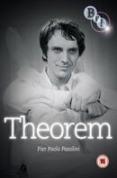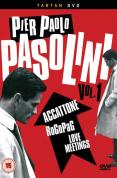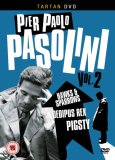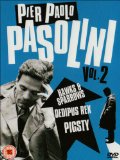![Hawks and Sparrows [Masters of Cinema] (DVD) [1966]](/pictures/1116105.jpg) Hawks and Sparrows | DVD | (23/07/2012)
from £N/A
| Saving you £N/A (N/A%)
| RRP
Hawks and Sparrows | DVD | (23/07/2012)
from £N/A
| Saving you £N/A (N/A%)
| RRP One of the handful of films that found Pier Paolo Pasolini sustaining a merrier mode of cultural assault, Hawks And Sparrows (Uccellacci E Uccellini) features Italy's popular comic actor Tot (known to cinephiles as the star of Roberto Rossellini's Dov' la liberta...?) and Pasolini regular Ninetto Davoli in a picaresque fable that lampoons politics, religion, and the legacy of neorealism.A crow gifted with the power of speech accompanies wandering duo Tot and Ninetto on a trail that leads to their roles as Franciscan friars who preach to the literal hawks and sparrows, before returning in time to gaze upon slum-dwellers, Danteist dentists, itinerant actor-hippies, and, ultimately, the state of the modern world.
![The Decameron [1972]](/pictures/1020291.jpg) The Decameron | DVD | (07/05/2001)
from £12.08
| Saving you £7.91 (65.48%)
| RRP
The Decameron | DVD | (07/05/2001)
from £12.08
| Saving you £7.91 (65.48%)
| RRP The first of Pasolini's colourful and highly erotic Trilogy of Life films based on famous story circles (to be followed by 'The Canterbury Tales' and 'Arabian Nights') 'The Decameron' contains ten stories based on the fourteenth century works of Giovanni Boccaccio. Capturing the bawdy earthy spirit of the original the film romps through its tales of sex and death - of lusty nuns and priests cuckolded husbands murdered lovers and grave-robbers with five of the stories linked by an artist 'Giotto's pupil' played by Pasolini himself.
![Mamma Roma - (Mr Bongo Films) (1962) [DVD]](/pictures/1107224.jpg) Mamma Roma - (Mr Bongo Films) (1962) | DVD | (25/04/2011)
from £11.59
| Saving you £6.40 (55.22%)
| RRP
Mamma Roma - (Mr Bongo Films) (1962) | DVD | (25/04/2011)
from £11.59
| Saving you £6.40 (55.22%)
| RRP Pasolini's Mamma Roma stars the Academy award-winning Anna Magnani (The Rose Tattoo) who plays the lead role of a prostitute who attempts to better her life for her son Ettore (Ettore Garofolo - Ro.Go.Pa.G.). But her efforts may be too late as Ettore is drawn to the street life and ironically falls for a young whore.
![Salo, Or The 120 Days Of Sodom [1975]](/pictures/1086241.jpg) Salo, Or The 120 Days Of Sodom | DVD | (29/09/2008)
from £49.99
| Saving you £-27.00 (N/A%)
| RRP
Salo, Or The 120 Days Of Sodom | DVD | (29/09/2008)
from £49.99
| Saving you £-27.00 (N/A%)
| RRP Pasolini's controversial film has been widely regarded to be one of the most disturbing ever made based on the book The 120 Days of Sodom by the Marquis de Sade. Pasolini transposes the setting of De Sade's book from 18th century France to the last days of Mussolini's regime in the Republic of Sal''.
![RoGoPaG [Masters of Cinema] (Dual Format Edition) [Blu-ray] [1963]](/pictures/1116108.jpg) RoGoPaG | Blu Ray | (27/08/2012)
from £N/A
| Saving you £N/A (N/A%)
| RRP
RoGoPaG | Blu Ray | (27/08/2012)
from £N/A
| Saving you £N/A (N/A%)
| RRP Conceived by the legendary Italian producer Alfredo Bini, the multi-director portmanteau film Let's Wash Our Brains: RoGoPaG (Laviamoci il cervello: RoGoPaG) brought together four giants of European cinema to contribute comic episodes reflective of the swinging post-boom era. The resulting omnibus collectively examines social anxieties around sex, nuclear war, religion, urbanisation - and the promise of a modern cinema.Roberto Rossellini's Illibatezza [Virginity] follows an airline stewardess plagued by an obsessed American tourist whose 8mm camera enables the indulgence of a personal, and solipsistic, vision of the Ideal. Jean-Luc Godard's Il nuovo mondo [The New World] takes place in an Italian-dubbed Paris beset by nuclear fallout, and wittily chronicles the changes that take place in the lives - and medicine cabinet - of a handsome young couple. Pier Paolo Pasolini's scandalous La ricotta [Ricotta, as in the curded cheese] presents the goings-on around a film shoot devoted to the Crucifixion and presided over by none other than Orson Welles (playing a kind of stand-in for Pasolini himself); it is this episode that landed Pasolini with a suspended four-month prison sentence. Lastly, Ugo Gregoretti's Il pollo ruspante [Free-Range Chicken] depicts a middle-class Milanese family flirting with the purchase of real-estate and engaging catastrophically with an antagonistic consumeristinfrastructure.
 Theorem (Stamp) | DVD | (24/09/2007)
from £N/A
| Saving you £N/A (N/A%)
| RRP
Theorem (Stamp) | DVD | (24/09/2007)
from £N/A
| Saving you £N/A (N/A%)
| RRP A handsome enigmatic stranger (Terence Stamp) arrives at a bourgeois household in Milan and successfully seduces each family member not forgetting the maid. Then as abruptly and mysteriously as he arrive he departs. Unable to endure the void left in their lives the father (Massimo Girotti) hands over his factory to the workers the son abandons his vocation as a painter the mother (Silvana Mangano) abandons herself to random sexual encounters and the daughter sinks into catatonia. The maid (Laura Betti) however becomes a saint.
![Arabian Nights [DVD] [1974]](/pictures/1092543.jpg) Arabian Nights | DVD | (27/04/2009)
from £21.00
| Saving you £-1.01 (N/A%)
| RRP
Arabian Nights | DVD | (27/04/2009)
from £21.00
| Saving you £-1.01 (N/A%)
| RRP The final part of Pasolini's Trilogy of Life series was two years in the making. The locations - Yemen Ethiopia Iran and Nepal - form a rich exotic backdrop to these tales of slaves and kings potions betrayals demons and most of all love and lovemaking in all its myriad forms. Engrossing mysterious profound and liberating this is an exquisitely dreamlike sensuous and adult interpretation of the original folk tales presented here in a beautiful new high definition restoration.
![Salo, Or The 120 Days Of Sodom [Blu-ray] [1975]](/pictures/1086240.jpg) Salo, Or The 120 Days Of Sodom | Blu Ray | (02/10/2008)
from £27.95
| Saving you £-2.96 (N/A%)
| RRP
Salo, Or The 120 Days Of Sodom | Blu Ray | (02/10/2008)
from £27.95
| Saving you £-2.96 (N/A%)
| RRP ![OEDIPUS REX [EDIPO RE] (Masters of Cinema) (DVD)](/pictures/1118655.jpg) OEDIPUS REX | DVD | (24/09/2012)
from £N/A
| Saving you £N/A (N/A%)
| RRP
OEDIPUS REX | DVD | (24/09/2012)
from £N/A
| Saving you £N/A (N/A%)
| RRP Three years after The Gospel According to Matthew, Pier Paolo Pasolini resumed his series of classical adaptations with a savage, highly personal take on Sophocles' ancient Greek tragedy Oedipus Rex (Edipo Re). As his first colour feature, Oedipus Rex makes brilliant use of wildly alternating Moroccan landscapes to transpose collective myth into a particular vision that is at once tender, sensual, and wholly unsparing. The film is divided into three sections set in different er...
![The Canterbury Tales [DVD] [1972]](/pictures/1092595.jpg) The Canterbury Tales | DVD | (27/04/2009)
from £N/A
| Saving you £N/A (N/A%)
| RRP
The Canterbury Tales | DVD | (27/04/2009)
from £N/A
| Saving you £N/A (N/A%)
| RRP The second part of Pasolini's trilogy is based on the 14th century stories of Geoffrey Chaucer. Plunging with gusto into some of the blackest and bawdiest of the tales Pasolini celebrates almost every conceivable form of sexual act with a rich earthy humour. The film's visual magic is complimented by this new high-definition restoration. Tom Baker is included in a largely British cast with the director himself taking on the role of Chaucer.
![Arabian Nights [1974]](/pictures/1006222.jpg) Arabian Nights | DVD | (17/09/2001)
from £N/A
| Saving you £N/A (N/A%)
| RRP
Arabian Nights | DVD | (17/09/2001)
from £N/A
| Saving you £N/A (N/A%)
| RRP The final part of Pasolini's Trilogy of Life series following The Decameron and The Canterbury Tales was two years in the making. The locations - Yemen Ethiopia Iran and Nepal - form a rich exotic backdrop to these tales of slaves and kings potions betrayals demons and most of all love and lovemaking in all its myriad forms. Engrossing mysterious profound and liberating - Arabian Nights is an exquisitely dreamlike sensuous interpretation of the original folk tales praised by novelist and arab scholar Robert Irwin as wonderful... the only version made for adults.
![The Canterbury Tales [Blu-ray] [1972]](/pictures/1092596.jpg) The Canterbury Tales | Blu Ray | (27/04/2009)
from £N/A
| Saving you £N/A (N/A%)
| RRP
The Canterbury Tales | Blu Ray | (27/04/2009)
from £N/A
| Saving you £N/A (N/A%)
| RRP The second part of Pasolini's trilogy is based on the 14th century stories of Geoffrey Chaucer. Plunging with gusto into some of the blackest and bawdiest of the tales Pasolini celebrates almost every conceivable form of sexual act with a rich earthy humour. The film's visual magic is complimented by this new high-definition restoration. Tom Baker is included in a largely British cast with the director himself taking on the role of Chaucer.
![The Witches [DVD]](/pictures/1145960.jpg) The Witches | DVD | (08/01/2018)
from £7.99
| Saving you £N/A (N/A%)
| RRP
The Witches | DVD | (08/01/2018)
from £7.99
| Saving you £N/A (N/A%)
| RRP The Witches In the mid-sixties, famed producer Dino De Laurentiis brought together the talents of five celebrated Italian directors for an anthology film. Their brief was simple: to direct an episode in which Silvana Mangano (Bitter Rice, Ludwig) plays a witch. Luchino Visconti (Ossessione, Death in Venice) and screenwriter Cesare Zavattini (Bicycle Thieves) open the film with The Witch Burned Alive, about a famous actress and a drunken evening that leads to unpleasant revelations. Civic Sense is a lightly comic interlude from Mauro Bolognini (The Lady of the Camelias) with a dark conclusion, and The Earth as Seen from the Moon sees Italian comedy legend Totò team up with Pier Paolo Pasolini (Theorem) for the first time for a tale of matrimony and a red-headed father and son. Franco Rosso (The Woman in the Painting) concocts a story of revenge in The Sicilian s Wife, while Vittorio De Sica (Shoeshine) casts Clint Eastwood as Mangano s estranged husband in An Evening Like the Others, concluding The Witches with a stunning homage to Italian comic books. Features: Brand new 2K restoration from original film elements produced by Arrow Films exclusively for this release Standard Definition presentation Original Italian mono audio Brand-new audio commentary by film critic and novelist Tim Lucas Interview with actor Ninetto Davoli, recorded exclusively for this release English-language version of Vittorio De Sica s episode, An Evening Like the Others, starring Clint Eastwood Reversible sleeve featuring original and newly commissioned artwork by Graham Humphreys
![The Decameron [DVD] [1970]](/pictures/1092598.jpg) The Decameron | DVD | (27/04/2009)
from £9.22
| Saving you £10.77 (116.81%)
| RRP
The Decameron | DVD | (27/04/2009)
from £9.22
| Saving you £10.77 (116.81%)
| RRP The first of Pasolini's colourful entertaining and highly erotic Trilogy of Life films The Decameron tells ten stories based on 14th century originals. Full of bawdy earthy spirit and presented in high definition restoration the film romps through its tales of sex and death - of lusty nuns and priests cuckolded husbands murdered lovers and grave robber - with five of the stories linked by the character of an intriguing artist played by Pasolini himself.
![The Decameron [Blu-ray] [1970]](/pictures/1092599.jpg) The Decameron | Blu Ray | (27/04/2009)
from £N/A
| Saving you £N/A (N/A%)
| RRP
The Decameron | Blu Ray | (27/04/2009)
from £N/A
| Saving you £N/A (N/A%)
| RRP The first of Pasolini's colourful entertaining and highly erotic Trilogy of Life films The Decameron tells ten stories based on 14th century originals. Full of bawdy earthy spirit and presented in high definition restoration the film romps through its tales of sex and death - of lusty nuns and priests cuckolded husbands murdered lovers and grave robber - with five of the stories linked by the character of an intriguing artist played by Pasolini himself.
 Pier Paolo Pasolini Vol.1 | DVD | (26/02/2007)
from £N/A
| Saving you £N/A (N/A%)
| RRP
Pier Paolo Pasolini Vol.1 | DVD | (26/02/2007)
from £N/A
| Saving you £N/A (N/A%)
| RRP A triple feature collection from revered Italian director Pier Paolo Pasolini. Accatone (1961): Pasolini's first film is a painfully realistic study of a pimp in Rome. Vittorio Accattone has never worked a day in his life and has apparently made a good living prostituting his female companion Maddalena. But her arrest begins his decline; hungry he begs from churches and even visits his estranged wife and son. When Stella a lovely and unbelievably innocent peasant worker enters his life Accattone tries to find a way honest or not to bring back good fortune... RoGoPaG (Dir. Pier Paolo Pasolini Jean Luc Godard Ugo Gregoretti Roberto Rossellini 1963): RoGoPag is an anthology of four short films by a quartet of world-renowned directors. Roberto Rosselini's Illibatezza (Virginity) chronicles a beautiful Italian stewardess's efforts to dissuade a desperate American suitor despite his near-psychotic persistence. Pier Paolo Pasolini's controversial La Ricotta (Curd Cheese) takes an irony-laden look at the bizarre goings-on during a film shoot that aims to re-create the Biblical story of Jesus (starring Orson Welles as an incredibly pretentious director). Jean-Luc Godard's Il Nuevo Mondo (New World) equates the ending of a problematic love affair with a tragic nuclear holocaust. And finally Ugo Gregoretti's Il Pollo Ruspante (Range-Grown Chicken) takes a comedic - and tragic - look at the world of advertising as a young family treks into the country to contemplate buying a plot of land. With these shorts each director takes time to further explore the themes that permeate their feature-length works focusing on issues of religion jealousy and corporate influence in the early 1960s. Love Meetings (1965): Microphone in hand Pier Paolo Pasolini asks Italians to talk about sex: he asks children where babies come from young and old women if they are men's equals men and women if a woman's virginity matters how they view homosexuals how sex and honor connect if divorce should be legal and if they support closing the brothels (the Merlina Act). He periodically checks in with Alberto Moravia and Cesare Musatti. Bersani is intrusive and judgemental prodding those who answer. The film's thesis: despite the booming post-war economy Italians' attitudes toward sex are either rigidly Medieval (the poor and the South) or muddled and self-censoring (the bourgeoisie and the North).
 Pier Paolo Pasolini Vol.2 | DVD | (23/04/2007)
from £N/A
| Saving you £N/A (N/A%)
| RRP
Pier Paolo Pasolini Vol.2 | DVD | (23/04/2007)
from £N/A
| Saving you £N/A (N/A%)
| RRP Hawks And Sparrows (1966): The Hawks and the Sparrows a wildly comic fable stars the beloved stone-faced clown Toto as an Italian everyman the Ninetto Davoli as his good-natured but empty-headed son. Pasolini uses a comic crow which philosophizes amusingly and pointedly about the passing scene as a counterpoint to the performers representing humanity as they progress down the road of life. Pasolini presents a tragic fable which shows two delightful innocents caught like many Italians between Church and Marxism. Oedipus Rex (1967): A dark and riveting retelling of the classic Greek tragedy Oedipus Rex. Unknown to himself Oedipus kills his father and marries his mother. When the truth is discovered he puts out his eyes and Oedipus wanders the streets until he is found by his daughter Antigone a common blind beggar. Set in Morocco the film is a visual wonder of desert landscapes and powerful Moorish architecture. The interesting cast include avant garde film and theater director Carmelo Bene Julian Beck from New York's Living theater and Pasolini himself as the High Priest. This remastered version is a must for any serious video collector. Pigsty (1969): Porcile (Pigsty) the story of a cannibal in a medieval wasteland is interwoven with that of the son of an ex-Nazi industrialist in modern day Germany. The young German who is more attracted to pigs than his fiance and the cannibal become sacrificial victims of their different societies. This strange grotesque and thought provoking parable is filmed with such a calm beauty and underlying disgust that it gains a deep significance as an attack on the middle classes of the 20th century.
 Pier Paolo Pasolini Vol.2 | DVD | (19/12/2008)
from £N/A
| Saving you £N/A (N/A%)
| RRP
Pier Paolo Pasolini Vol.2 | DVD | (19/12/2008)
from £N/A
| Saving you £N/A (N/A%)
| RRP ![Trilogy Of Life [1971]](/pictures/1091678.jpg) Trilogy Of Life | DVD | (27/04/2009)
from £N/A
| Saving you £N/A (N/A%)
| RRP
Trilogy Of Life | DVD | (27/04/2009)
from £N/A
| Saving you £N/A (N/A%)
| RRP Trilogy Of Life
![Salò, or The 120 Days of Sodom [Blu-ray]](/pictures/1087003.jpg) Salò, or The 120 Days of Sodom | Blu Ray | (29/09/2008)
from £N/A
| Saving you £N/A (N/A%)
| RRP
Salò, or The 120 Days of Sodom | Blu Ray | (29/09/2008)
from £N/A
| Saving you £N/A (N/A%)
| RRP Pasolini's controversial film has been widely regarded to be one of the most disturbing ever made based on the book The 120 Days of Sodom by the Marquis de Sade. Pasolini transposes the setting of De Sade's book from 18th century France to the last days of Mussolini's regime in the Republic of Sal''.

Please wait. Loading...
This site uses cookies.
More details in our privacy policy